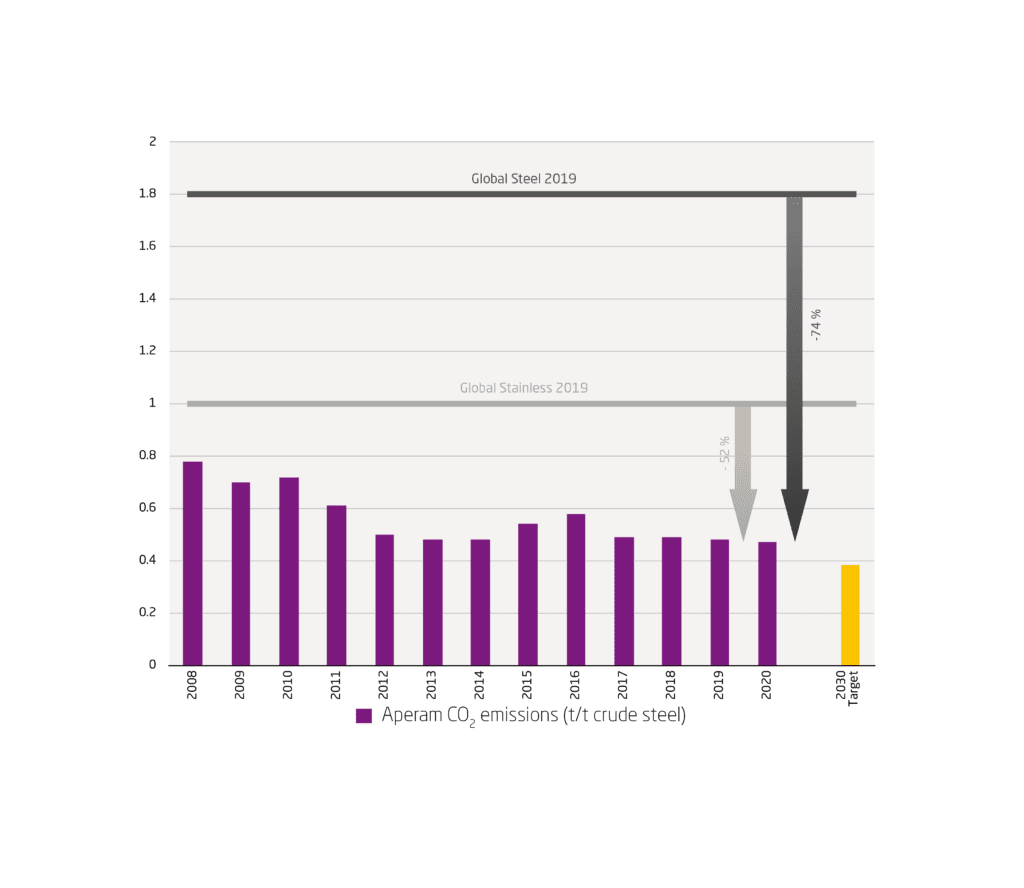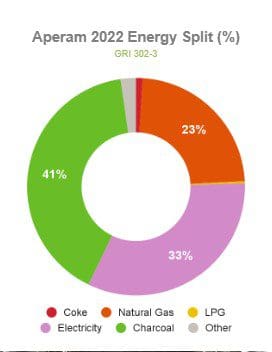CO2 & Energy
Home Sustainability Environment CO2 & Energy
Environmental Sustainability

Aperam’s CO2 performance and strategy
In the context of the responsibility of its sector (link), Aperam has a leading carbon footprint, which is regularly confirmed by comparisons versus peers using externally-verified figures. This is the result of three key factors:
- Our European electric arc furnaces use as much scrap metal as possible instead of extractive raw materials. Aperam is already using over 80% of scrap in its European EAFs, on average, and is working on further increasing its scrap intake.
- On top of having a very low level of energy consumption, we also use a low-carbon energy mix in our French and Belgium melting shops.
- We are operating more than 100,000 ha of FSC®-certified forest in Brazil to produce our own charcoal, which we then use in our steel-making process as a natural and renewable substitute for fossil fuels (coal based coke).
As to this last point, Aperam can also be considered an agriculture company as we maintain eucalyptus forests and carbonize the trees to sustainably produce our own charcoal and entirely eradicate the use of extractive coke. You can read more about our BioEnergia forest here.
Refining an Already Best-in-Class CO2 Performance
In its drive to continuously improve its environmental performance, Aperam recently announced several objectives to enhance our environmental excellence. These include the goals of further reducing our carbon emissions (-30% scope 1+2 vs 2015) by 2030 and becoming carbon neutral by 2050, objectives that apply to all our steel-making units. You can find more information about our 2030/2050 objectives here.
Since 2017, our CO2 footprint has been constantly below 0.5 tons of CO2 per ton of crude steel produced, from 0.55 in 2015. In 2020, we achieved a 35% reduction in intensity versus 2007, confirming our position as having a leading CO2 footprint in our industry. With 2020 Scope 1 and Scope 2 emissions of 666,372 and 255,665 kg. CO2 in absolute value, we reduced our total CO2 emissions (scope 1+2) by 5% over 2019, which represents a 14% decrease in intensity since 2015.
What this all means is that Aperam is well on the way to achieving its CO2 2030 objective.
Energy Mix and Performance
Aperam’s energy mix remains a subject of pride, with 39% already coming from renewable charcoal biomass. Our total energy use in 2020 was 2.2 MWh/tcs, which represents a 4% reduction over 2019 for natural gas, LPG, and electricity – our primary focus – and a 5.4% reduction in total energy consumption since 2015. This is a significant improvement in efficiency and, thanks to various ongoing efforts to further improve our performance, Aperam is on track to achieve its mid-term target of an 11% reduction in energy use by 2030.
But even with this success, we refuse to stand still and thus remain committed to pursuing other renewable energy sources, including wind and solar power. In fact, our production plants in Genk, Châtelet and Isbergues have all recently installed windmills and/or solar panels. The solar installation that is under construction at our plant in Genk anticipates a yearly energy production of 20,300 MWh, thereby saving 7,300 tons of CO2 every year. This is equal to the annual emissions of 5,900 average households and/or what can be absorbed by a 720ha of forest.



 -0,95%
-0,95%



